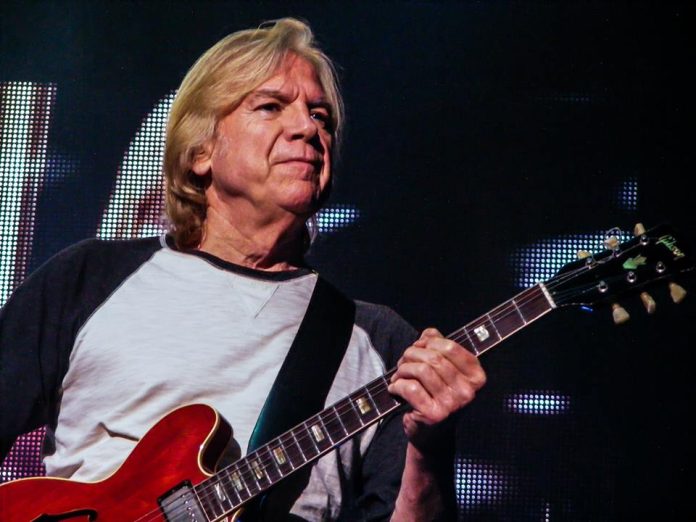HIT CHANNEL EXCLUSIVE INTERVIEW: August 2023. We had the tremendous honour to talk with a legendary musician and songwriter: Justin Hayward. He is best known as the lead singer and guitarist of The Moody Blues since 1966. His latest solo release is the “Living for Love” single. Also, he is going perform with the Athens State Orchestra at Herodeion in Athens, Greece on 29 September along with Dave Evans (original singer and founding member of AC/DC) and Maggie Reilly (vocals) of Mike Oldfield Band. Read below the very interesting things he told us:
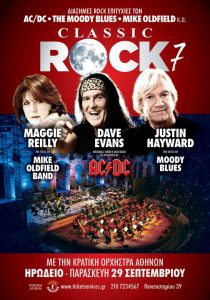 What made you to accept the offer to play with an orchestra in Athens on 29th September?
What made you to accept the offer to play with an orchestra in Athens on 29th September?
I think a moment of madness (laughs). That’s the badger, yes. Well, I’m always up for a challenge, Thodoris.
What should fans expect from your set in Athens?
I haven’t decided it yet. At least, one song I know which is “Nights in White Satin”, so I will be looking forward to that. I haven’t decided along the other things yet.
The Moody Blues were one of the very first bands who recorded with an orchestra. How much different experience is it to play with an orchestra than with your standard rock band setting?
Well, that’s interesting. You know, we didn’t actually play with the orchestra. I mean, I think you are talking about “Days of Future Passed” (1967) , but at no time did we play with the orchestra. So, we recorded our songs in a couple of days and then Peter Knight, who was the orchestral arranger took the themes of three of those songs: “Nights in White Satin”, “Tuesday Afternoon” and “Another Morning” and maybe “Dawn Is a Feeling” as well and used them to link the songs together. So, the orchestra would lead into the songs and lead out of them. Actually, the orchestral sounds you hear on our songs are all by an instrument called the mellotron. At no time we were playing with an orchestra, but it has that impression. That was what the executive producers were looking for, so there would be that identity between the two kinds of sounds.
“Living for Love” is your latest single. Would you like to tell us a few words about this?
Yes, that’s right. I was just playing around on the guitar and these songs just jumped out of the guitar sometimes. I just started this recording at home and I was just making a small demo of the guitar and then I really liked it. I really liked the guitar sound and it’s a Gibson J200 that I have and I haven’t used it for anything else before that. I usually use my Martin guitar. This song came out of that and it was a very happy day. I thought about putting other things on it, but it’s a very simple record and it’s a very simple sentiment about how lucky myself and my generation were that we didn’t have the distractions that there are in the world today for young people; that we were living our lives really through music. We would go as teenagers from one record to the next record to the next record and that was our life. Our lives were about going to somebody’s house or knowing somebody at school that had a record. My brother and I only had a few records but we could go to somebody else’s house that had a few more and our lives revolved around that and I think that’s the sentiment in the song and I hope that the song evokes that. It does in me, that’s for sure.
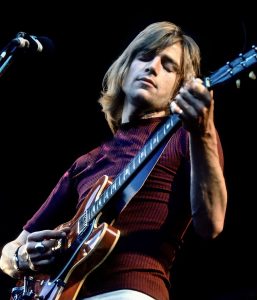 Are you satisfied with the response you got from fans and press for “Living for Love” single?
Are you satisfied with the response you got from fans and press for “Living for Love” single?
It’s not finished yet. Because I have never been under pressure to make a hit record or design something that specifically meant to be a hit record, I ‘m happy that I have the opportunity to play live and to keep these songs alive. “Living for Love” is a song that is going to be a big part of my show for the next couple of years, I think. So, I hope I’ve answered your question. Yes, I am because the response that we get when we play it and when people hear it, it’s nice, flattering and beautiful.
In October there will be another leg of your Harmony Tour in the United States. How much different are the versions of the songs when you are doing an acoustic set?
Well, it’s kind of acoustic/electric and I think I’m doing the version of my songs as they were when I wrote them. So, that’s the sound of my own music room and also the guitars that I bring on my tours in America are the guitars from my own home and this is how the songs sounded to me. Now, I ‘m very lucky to be with Julie Ragins, who‘s been with The Moody Blues as well, she always harmonizes perfectly with me and then does the harmonies that I would have done on the record. And of course, Karmen Gould, a brilliant young flute player and Mike Dawes who brings his own genius to every concert and also is the opening act for me. I’m very happy to be utilizing in this format. I’m not sure I ‘m ready to go back to a really loud 200, 500 watts amplifier/drums tour yet, but I don’t rule it out in the future.
Are you looking forward to doing the On the Blue Cruise in April 2024 with The Zombies, Alan Parsons and others?
Very much. I think everyone on those cruises is there for the same reason: Because they love the music and they want to share that with people who feel the same, so it’s always a privilege to be there. Yes, I look forward to it. It’s a wonderful company to be in and like I say, we are all there for the same reason, for the same purpose which is very nice.
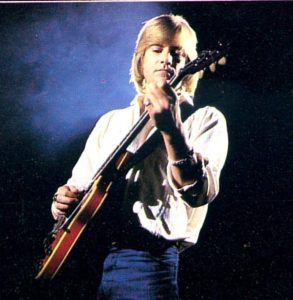 “Days of Future Passed” (1967) is probably the first ever progressive rock album. Did you realise when you recorded it that you created a revolutionary album?
“Days of Future Passed” (1967) is probably the first ever progressive rock album. Did you realise when you recorded it that you created a revolutionary album?
Did we? I don’t know. No, I don’t think we could say that. No. In fact, it was an album that was recorded to demonstrate stereo; that stereo could be as interesting for rock ‘n’ roll as it was for classical music and that was the intention of the record company. So, I ‘m not sure that anybody thought that there would be a hit record with hit singles in it and I think it was only the slow familiarity really as “Nights in White Satin” gained attention, then it drew attention to the album. We were very lucky to be given the opportunity to record our sounds in that, particularly “Nights in White Satin” because we didn’t have anything else, we had no power, no influence. But on the record company there were a couple of people who liked what we were doing and took a chance. They took a chance on us and it worked.
Were you surprised with the huge commercial success of “Nights in White Satin” (1967)?
Yes! Yes, in fact, in America they didn’t release it first. They released a song called “Tuesday Afternoon” from the album. But, I think we, in the band always knew that there was a feeling about the song that was interesting and intriguing. Also, in the live context, we knew that people loved it very much, but it didn’t fit any of the rules of releasing as a single. I think at the time the promotion people in Decca and in the record companies around Europe and in America too, said that it’s too long and too slow and they didn’t want to release it as a single. It didn’t make any difference to me; that was their thing. But we knew in the group that it was always a very popular part of our live set. So, yes, it was always interesting because it came back two other times: It came out in 1967 and came back again in 1972 and in the UK came back again in 1979, I think. It had maybe its biggest success then.
“Question” from “A Question of Balance” (1970) is one of my favourite songs ever! What’s the story behind this amazing song?
I knew that there was a recording session the next day and that the other guys in the band were expecting me to have a song really for that recording session, but in the middle of the night I still didn’t have a complete song. I had two completely different songs and at the last minute in the night I thought: “Maybe if I put them together and connect the sentiment of the two songs it would work” and I took it into the studio the next morning, it was a Saturday and I played it to the other guys. They didn’t even know it was two songs, they just said: “Oh, great! Let’s get over it!” It was a very simple recording and I think that was the most satisfying time in The Moody Blues, really. We had great success with that as a single and then of course the Isle of Wight Festival happened, which was a difficult festival for the promoters but not for us. For us, the crowd knew the song “Question”, it had been a hit and everybody started to relax again and it was a wonderful moment. Yeah, wonderful moment.
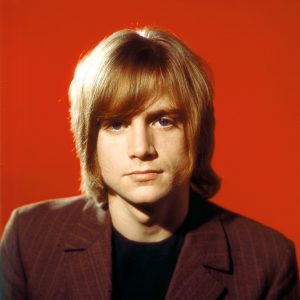 How did you come up with the idea to play sitar on “Om” from “In Search of the Lost Chord” (1968)?
How did you come up with the idea to play sitar on “Om” from “In Search of the Lost Chord” (1968)?
Well, during the “Days of Future Passed” sessions -even earlier- we noticed that The Beatles had different instruments in the studio that they could make use of them at the EMI Studio and I think myself and Mike Pinder (ed: keyboards, mellotron) thought one afternoon that we got nothing much else to do: “Let’s go down to the shop where these Indian instruments come from”. I think Mike bought a tambura (ed: also called tanpura) which is a resonating instrument and I bought a sitar and then the two of us maybe got a bit stoned and with Ray Thomas (ed: flute) we started fooling around and then the next thing I know we have songs with sitar in it and I thought it was very nice. I still have my sitar and I still enjoy playing it.
Do you have any memories from your performance at The Isle of Wight Festival in 1970?
It was very difficult. We did two, maybe three Isle of Wight Festivals. I think we were there in ’69 as well, but the ’70 festival I said before it was a difficult festival because next door to the festival site was a hill and I think I lot of people gathered along the hill, who hadn’t paid and then the fence came down and there was a lot of trouble and disturbance. But when we went on, The Moody Blues, at the time of the evening when we went on, it was like a crowning influence that put the whole thing into focus. It was a big moment in that summer for us. As a festival, I think it was quite difficult for the promoters and for many other people on. I seem to remember that Joni Mitchell was on and somebody jumped on stage and grabbed the microphone and tried to say some kind of political message. But for us, everybody relaxed and it turned out great.
How important was the role of the producer Tony Clarke in The Moody Blues recordings?
Tony was a bass player as well. So, that was interesting: His ideas about how the bass should be. But he always saw the recordings in cinematic form, so sometimes he would explain them in cinematic form to me (laughs) and then I had to try and explain to the other guys: “Well, it’s E, A, B flat”, that kind of stuff, to try and put it in normal language, but his input was always very valuable and I think him and the engineer, Derek Varnals, were hugely influential on these recordings and they made them what they were. They couldn’t have sounded like that without Tony and Derek Varnals’ input.
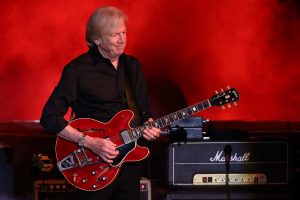 In the ‘80s, Tony Visconti (David Bowie, Thin Lizzy) produced two albums (1986’s “The Other Side of Life” and 1988’s “Sur la Mer”) for The Moody Blues. What do you think about these albums nowadays?
In the ‘80s, Tony Visconti (David Bowie, Thin Lizzy) produced two albums (1986’s “The Other Side of Life” and 1988’s “Sur la Mer”) for The Moody Blues. What do you think about these albums nowadays?
I think they sound just great. I think at the time we needed to change our ideas of how to make records and sounds. Timecode had started to be used and I was able to do things at home on my own demos with the timecode on it. If I could only have music from only one decade, I think it would be the 1980s. What Tony brought was disciple to the way we made music. He had a wonderful studio called Good Earth in Soho in London and we would work from 11 to 7; well, I would. Often, the other guys if they weren’t needed, they wouldn’t come. But I was there every day and I enjoyed that very much. I thought Tony’s contribution to the career of The Moody Blues, the story of The Moody Blues, is immense.
What does the 2018 Rock and Roll Hall of Fame induction mean to you?
It means a great deal and I was particularly pleased for The Moody Blues fans because it’s a validation of all of the music that they love, which is really special. It was a lovely occasion. I ‘m not sure that we had ever been nominated before, but the occasion itself was very special to me because in the ‘60s one of my own personal heroines was Nina Simone and she was inducted into the Rock and Roll Hall of Fame at the same ceremony that we were. Of course, she wasn’t there but her family members were there and it was a great thrill to me. I was happy that Mike Pinder was there with us as well, and that Greame (ed: drummer –died in 2021) was there. Ray Thomas (ed: flute) had passed some weeks before, which was so unbelievably sad. The validation for The Moody Blues fans was just tremendous though and I’m very-very pleased and happy about that.
Do you feel lucky that you got to know The Beatles?
I didn’t get to know The Beatles. I was in their company. I think Mike was always closer to The Beatles than the rest of us (ed: Mike Pinder introduced the mellotron to The Beatles, played harmonica on their song “The Fool on the Hill” and tambourine on two songs from John Lennon’s “Imagine” album). We were fortunate that we were at The Decca studio when they were at the EMI studio and often there was interaction between the two studios. But I’m very happy to be present in the time of The Beatles because they changed the world and opened the door for people like me.
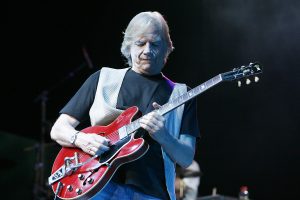 In 1983, Stevie Ray Vaughan opened 17 shows for The Moody Blues in North America. Did you have a good time touring with him?
In 1983, Stevie Ray Vaughan opened 17 shows for The Moody Blues in North America. Did you have a good time touring with him?
Very quiet man, tremendous player. I would listen to his set most nights and just be in awe of him. Yes, I thought he was one of the greatest guitar players ever and I’m very privileged to be included on the same bill.
Was it an interesting experience for you to sing “Still Waters Run Deep” on Rick Wakeman’s “Return to the Centre of the Earth” (1999)?
Oh, you found some obscured things, Thodoris! I wish I had a clear memory of it, but I ‘ve never regretted any recording, that’s for sure. Rick has always been a good friend and so, I do remember having a lot of fun, a lot of pleasure.
Did you enjoy performing with Ian Anderson (Jethro Tull) and Bruce Dickinson of Iron Maiden at the Canterbury Cathedral in 2011?
Fantastic! Absolutely brilliant! Loved every moment, yes! A great day and a great evening. Lovely people! I’ve known Ian for a long time; Bruce, I didn’t know before but he is a gentleman and a great pleasure to be with him.
Do you believe that popular music which was written in the ‘60s and ‘70s is much better than today’s music?
No, I don’t think so. I would never say that because there are a lot of changes to music for the young people. Young people now are falling in love and loving the records that I make now and those stay with them all their lives. I couldn’t agree with that, no.
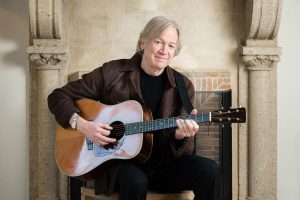 You were on the same label with Alvin Lee (Ten Years After), you toured together and you used the same guitar model (Gibson ES-335). Was there any kind of competition between you and Alvin Lee?
You were on the same label with Alvin Lee (Ten Years After), you toured together and you used the same guitar model (Gibson ES-335). Was there any kind of competition between you and Alvin Lee?
No, not at all! Not at all! I didn’t really think about it that much. Now, I remember he used my amplifier a few times, but no. We were part of the Decca group of musicians that we were used to playing with each other and being on the same bill. Yes, I think Ten Years After were a great Decca band and had a tremendous following, as well. I think the feeling was mutual.
You have played both in arenas and theatres. Do you think playing in smaller venues there is more warmth between the musicians and the audience?
It’s a different kind of atmosphere and a different feeling. I have always treasured both experiences and all kinds of experiences and I’ve spent my life on the road before I join The Moody Blues as well, when I left school and became a professional musician within a few months with a rock ‘n’ roll singer called Marty Wilde and his wife. So, each of these experiences is valuable. Yeah, I wouldn’t put one more above the other but I’m very privileged to have done arena tours as well as theatres. I do love a theatre with a nice sound, with a nice ambiance and warmth about it. Theatres, there is such a history in their walls and in their ambiance and feeling. In the dressing rooms you can feel it: The artists that have been there before and on the stages themselves, they resonate the ambiance with the years, with music and performances.
Do you have any musical ambitions left?
My ambition now is to keep doing what I am doing. Yes, and to put someone to phone to me and somebody to ask me.
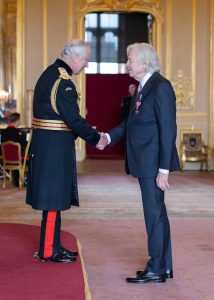 Last month you met with King Charles. What is like to be an Officer of the Order of the British Empire (OBE)?
Last month you met with King Charles. What is like to be an Officer of the Order of the British Empire (OBE)?
I‘m very honoured by that and I awarded the honour by our late Queen in last year’s Birthday Honours List. But, as we all know, I was awarded the honour by Her Majesty The Queen in June of last year and then of course, she passed away in October. So, I was very happy indeed to be first honoured by Her Majesty The Queen and then to receive the honour by His Majesty The King. The day of the investiture at Windsor Castle was one of the most wonderful days of my life. It was full of kindness, consideration, beautiful organization, conversation and for me and my family was truly a dream and an honour.
Do you know who lives permanently in Athens and you may meet him backstage? He has done the same show as you at the same venue.
That would be Mario Frangoulis.
No, I mean from you era: ‘60s London. Do you know who lives in Athens permanently?
You are going to tell me, Thodoris.
Eric Burdon (vocals) from The Animals! You may meet him backstage. He went out for a dinner with Sting when he played at the same venue.
Oh, I didn’t know that! That would be nice! That would be nice, yeah. My experience is that dinner in Athens goes on until 3:00 in the morning (laughs). Lunch often lasts most of the afternoon. I’m very happy to be there. I‘m always happy to be in Greece and I look forward to it very much.
A huge “THANK YOU” to Mr. Justin Hayward for his time. I should also thank Mrs. Suzanne Cooper for her valuable help.
Official Justin Hayward website: https://justinhayward.com/
Official Justin Hayward Facebook page: https://www.facebook.com/justinhaywardmusic
Official Justin Hayward Twitter account: https://twitter.com/haywardmusic


